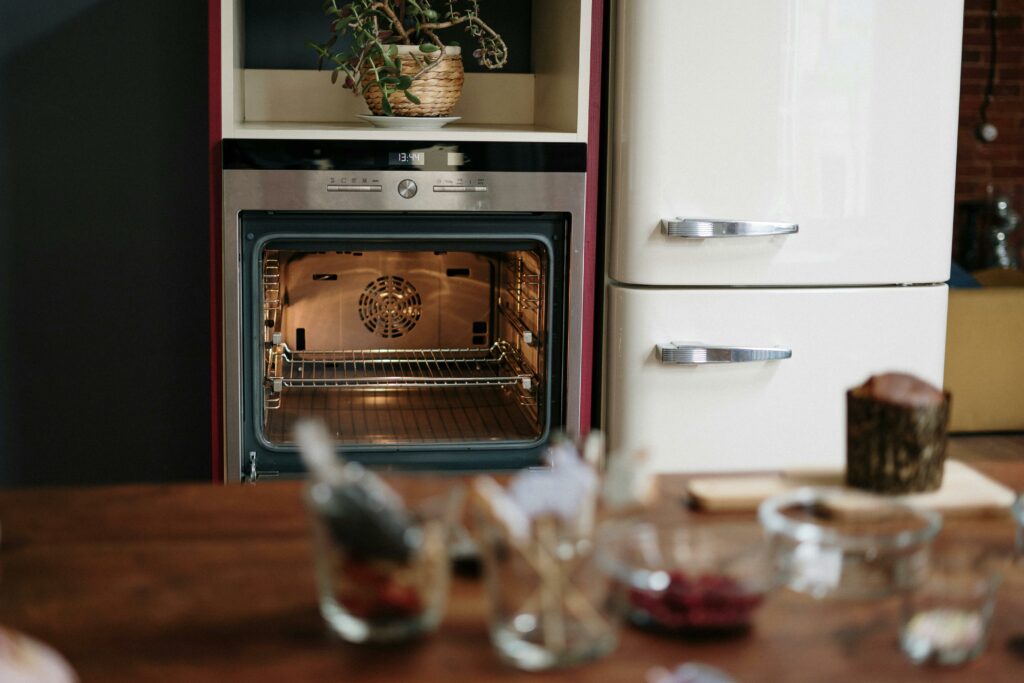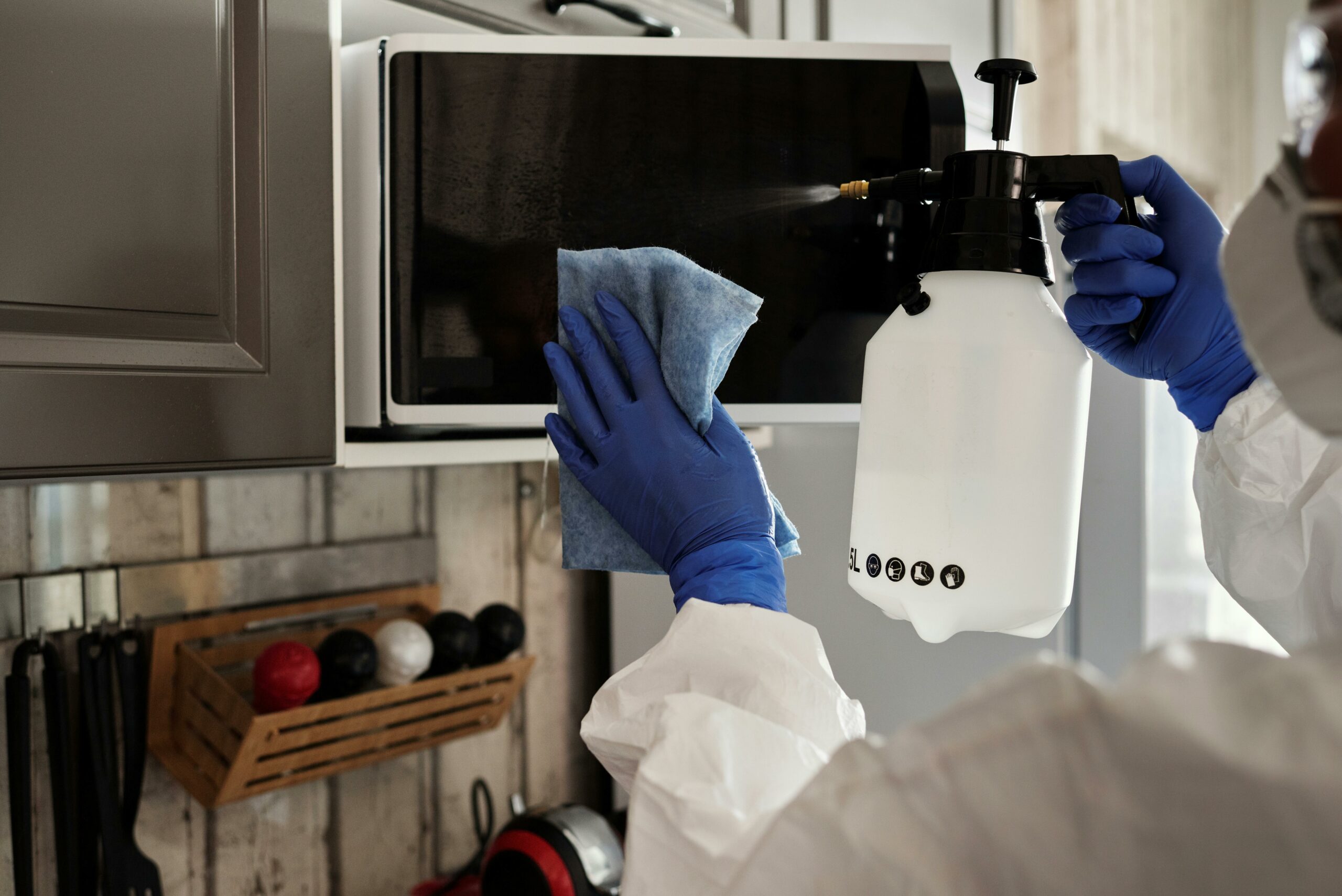Household appliances are essential in our daily lives, helping us store food, clean dishes, and keep our clothes fresh. However, over time, they can develop unpleasant odors due to trapped food particles, moisture buildup, and bacterial growth. Preventing bad smells in appliances is crucial not only for maintaining a pleasant home environment but also for ensuring the efficiency and longevity of these machines. A good cleaning routine is essential to eliminate existing odors and prevent new ones from forming.
Key Takeaways
- Moisture buildup and trapped food particles are the main causes of bad odors in appliances.
- Regular cleaning and proper ventilation help prevent unpleasant smells.
- Natural odor absorbers like baking soda and vinegar can effectively neutralize odors.
- Cleaning filters, drains, and seals reduces bacteria and mold growth.
- A structured cleaning routine ensures long-term freshness and appliance efficiency.
Why Do Appliances Develop Bad Odors?
Appliances are constantly exposed to food, moisture, and other organic materials that can lead to unpleasant smells. When not cleaned properly, bacteria and mold thrive, causing persistent odors that can transfer to food, dishes, or laundry. Understanding the root causes of appliance odors can help you take the necessary steps to prevent them.
Common reasons appliances develop odors include:
- Food residue and spills inside refrigerators, microwaves, and dishwashers.
- Moisture buildup in washing machines, dishwashers, and refrigerators, creating a breeding ground for mold and mildew.
- Clogged filters in dishwashers and washing machines that trap food, soap scum, and other debris.
- Lack of ventilation in appliances like refrigerators and ovens, trapping stale air and odors.
- Improper cleaning habits that allow grime and bacteria to accumulate over time.
By adopting a thorough cleaning routine, you can prevent these issues and ensure that your appliances remain odor-free and in optimal working condition.
Preventing Bad Odors in Appliances
Maintaining freshness in household appliances requires a proactive approach. A few simple habits can go a long way in preventing unpleasant odors and keeping your appliances functioning efficiently. Regular maintenance, proper storage of food and detergents, and immediate attention to spills and buildup are key to ensuring that appliances remain odor-free. In addition to cleaning after every use, setting up a weekly and monthly maintenance schedule will help eliminate odor-causing residues before they become a problem.
Maintaining freshness in household appliances requires a proactive approach. A few simple habits can go a long way in preventing unpleasant odors and keeping your appliances functioning efficiently.
Keep Appliances Dry
Excess moisture is one of the primary causes of bad odors in household appliances. When water or condensation is left to sit in enclosed spaces, it creates the perfect environment for mold, mildew, and bacteria to thrive. After each use, wipe down interior surfaces with a clean cloth and leave doors open whenever possible to allow proper air circulation. Drying rubber seals, trays, and compartments ensures that moisture does not become trapped, reducing the risk of musty smells. Moisture is one of the leading causes of bad odors in household appliances. After each use, it’s important to wipe down interior surfaces and leave doors open when possible to allow air circulation. For washing machines and dishwashers, keeping the door slightly open between uses prevents moisture buildup and mold growth.
Use Odor Absorbers
Odor absorbers help neutralize unpleasant smells before they become overwhelming. Natural solutions such as baking soda, activated charcoal, and white vinegar are highly effective at absorbing unwanted odors. Placing a small container of baking soda in the refrigerator, a cup of vinegar in the dishwasher, or a pouch of charcoal in the washing machine can significantly reduce lingering smells. These should be replaced every few weeks to maintain their effectiveness. Natural odor absorbers like baking soda, activated charcoal, and white vinegar help neutralize unwanted smells. Placing a small container of baking soda in the refrigerator, a cup of vinegar in the dishwasher, or charcoal inside the washing machine can significantly reduce odors.
Clean Filters and Drains Regularly
Many appliances have built-in filters and drainage systems that collect debris, soap scum, grease, and food particles over time. If left uncleaned, these areas become breeding grounds for bacteria and foul odors. Dishwashers, washing machines, and refrigerators should have their filters checked and cleaned at least once a month to prevent clogging and buildup. In addition, regularly flushing drains with a mixture of baking soda and vinegar can help keep them free of residue and bad smells. Filters and drainage systems in appliances collect debris and can become a source of bad smells. Cleaning dishwasher filters, washing machine lint traps, and refrigerator drip trays every few weeks can prevent foul odors from developing.
Avoid Leaving Food or Detergent Residue
Food particles, grease, and detergent residue can accumulate inside appliances, leading to persistent odors. To prevent buildup, always scrape off excess food before placing dishes in the dishwasher, wipe down oven interiors after cooking, and measure the correct amount of detergent when using washing machines. Overuse of soap can leave behind sticky residue that attracts dirt and bacteria, worsening odor problems over time. Leftover food particles in dishwashers, grease in ovens, and soap scum in washing machines contribute to bad smells. Ensuring that all food is removed before washing dishes, wiping oven interiors after cooking, and using the right amount of detergent in laundry cycles can make a significant difference.
Use the Right Cleaning Products
Harsh chemical cleaners can sometimes leave strong, lingering odors inside appliances, making them counterproductive in odor removal. Instead, opt for natural cleaning solutions like vinegar, baking soda, and lemon juice. These ingredients are effective at breaking down bacteria, grease, and buildup while leaving a fresh and clean scent. Additionally, using fragrance-free or mild detergents can help prevent the accumulation of strong chemical odors inside appliances. Harsh chemicals can sometimes leave strong, lingering odors inside appliances. Opt for natural cleaning solutions like vinegar, baking soda, and lemon juice, which effectively remove bacteria and odors without leaving harmful residues.

Step-by-Step Cleaning Routine for Odor-Free Appliances
A structured cleaning routine is key to keeping appliances free of bad smells. Here’s how to properly clean and maintain each appliance in your home.
Refrigerator
Refrigerators can develop strong odors from spoiled food, spills, and improper ventilation. A regular cleaning schedule ensures freshness and hygiene.
- Remove all food and discard expired or spoiled items.
- Wipe shelves and drawers with a mixture of warm water and vinegar.
- Clean the rubber door seals, which can trap mold and bacteria.
- Place an open box of baking soda inside to absorb odors.
- Keep food properly sealed to prevent strong smells from spreading.
Washing Machine
Washing machines are prone to developing moldy smells due to moisture buildup. Regular cleaning helps prevent these issues.
- Run a hot water cycle with vinegar to kill bacteria and remove soap residue.
- Wipe the drum, door, and rubber gasket with a cloth and mild detergent.
- Remove and clean the detergent drawer to prevent mold growth.
- Keep the lid or door open after each use to allow proper drying.
Dishwasher
Food particles and grease can accumulate in dishwashers, leading to foul odors. Proper maintenance ensures a fresh-smelling machine.
- Remove and rinse the filter to get rid of trapped debris.
- Run a cleaning cycle with vinegar or a dishwasher cleaner to break down buildup.
- Wipe the door seals and spray arms to remove grease and food particles.
- Leave the door open slightly after use to allow moisture to evaporate.
Microwave
Microwave odors linger due to food splatters and spills. Keeping it clean prevents persistent smells from transferring to new meals.
- Wipe the interior with a damp cloth after each use.
- Heat a bowl of water with lemon slices to loosen stuck-on food and neutralize odors.
- Remove and wash the turntable regularly.
- Keep the door slightly open after use to allow airflow.
Oven and Stovetop
Ovens and stovetops collect grease and food residue, causing smoke and bad smells when used. Deep cleaning prevents unpleasant odors.
- Remove food debris and grease from burners and oven racks.
- Use a paste of baking soda and water to scrub the oven interior.
- Wipe down control knobs and surfaces to remove accumulated grime.
- Clean the range hood and exhaust fan to prevent grease buildup.
Frequently Asked Questions
How often should I clean my appliances to prevent odors? Appliances should be cleaned regularly based on their use. Refrigerators and dishwashers should be cleaned at least once a month, while washing machines and microwaves benefit from bi-weekly maintenance. Ovens and stovetops should be cleaned after heavy use to prevent grease buildup.
Can I use natural cleaning products instead of chemical cleaners? Yes, natural cleaning products like vinegar, baking soda, and lemon juice are highly effective in removing odors and bacteria. They are safe for most appliances and help prevent exposure to harsh chemicals.
What should I do if my appliances still smell after cleaning? If bad odors persist, check hidden areas such as filters, door seals, and drainage trays for trapped debris. Running a cleaning cycle with vinegar or baking soda can help remove deep-set odors. If the smell continues, a professional appliance cleaning service may be necessary.
How can I prevent musty smells in my washing machine? Keeping the washing machine door open after each cycle allows moisture to evaporate. Running a hot water cycle with vinegar once a month and wiping down the drum and gasket can also prevent mold and mildew from developing.
Final Thoughts
Preventing bad odors in household appliances is essential for maintaining a fresh and hygienic home. By following a consistent cleaning routine and addressing potential odor sources, you can keep your appliances in excellent condition. Using natural cleaning solutions, ensuring proper ventilation, and regularly maintaining filters and seals will help eliminate unwanted smells and prolong the life of your appliances. Whether it’s the refrigerator, washing machine, dishwasher, or oven, taking the time to clean and care for these essential household tools will create a more pleasant living environment.





